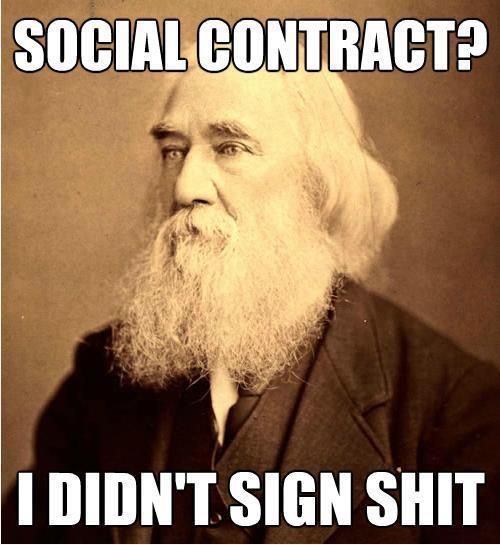
Let’s say you live in a small neighborhood of 100 houses. A private security firm (e.g. ADT) goes door to door selling their mobile security services. 70 of the houses sign up, but you are among the 30 which decline. The patrols begin, and their effect is positive as they reduce the level of break-ins throughout the neighborhood. Before long, a debate arises and the 70 houses begin to say “those other 30 are getting a free benefit and not paying their fair share!”. The neighborhood takes a vote and pass a local a local ordinance called the ‘Love it or Leave it’ rule whereas the 30 homes will now be forced to pay for the patrols as long as they choose to remain in the neighborhood. All 100 homes now pay an equal share.
- Is it moral to force the 30 homes to pay for a service they did not want?
- What about the fact you were allowed a vote, and still have the option to leave their homes if they don’t like it?
Now, let’s fast forward a couple generations. Most of the houses have been passed along via inheritance to their children, and the rest to sold to outsiders. Every 4 years, the patrol subject is put to a vote, but there has always been a slight majority which votes in favor to keep the patrols, but the apportionment of payment has changed. Now, the 10 largest houses in the neighborhood pay almost 90 percent of of the cost. The next 40 largest pay the remaining 10%, and the smallest 50 houses pay none. This is due to the ideas A) the houses are owned by the richest who can afford more, and B) they get more benefit since square footage is strongly correlated to more household wealth to protect. The Love it or Leave it law still stands, and each homeowner can leave if they don’t like this arrangement.
- Has the morality of the arrangement changed in your mind?
I have found that arguing natural law/rights with liberals and conservatives will usually take a couple distinct phases. First, they’ll cling to their utilitarian argument that these policies are “for the greater/public good”. This is very easy to hear when discussing drug laws, the military draft, welfare…etc. But, if it can be shown that the greater good is served, can we
- Oulaw tobaccco, alcohol, and fatty foods?
- Mandate every able-bodied person to exercise and maintain a certain BMI/weight?
- Make it illegal to view pornography?
- Put adulterers in jail?
- Just this one time, confiscate every penny from the wealthiest 3 people and give it to the neediest 100,000 people?
As you break that argument down, you show them that their own internal logic doesn’t even agree the greater good is the proper basis for law. Intuitively, people understand that we all have certain inalienable rights…
But, as fully accepting natural rights would require them to abandon so many of the current beliefs, our counterparts will then often retreat to the Social Contract argument.
“We all agree to these rules by living here. We have a representative government (at least some argue this exists here in the United States). If you don’t like the rules here, then move somewhere else”.
Is Social Contract Theory true?
- By the simple fact of being born in a specific territory, becoming an adult, choosing not to leave your family, friends and property behind, then you agreed to whatever terms are imposed by the ruling class?
- Can past or current individuals bind you to a contract without your express permission?
To say yes to these questions is to also deny that we have inalienable/natural rights as human beings. It is to affirm your belief that we only enjoy those rights and privelidges deemed appropriate by the rulers in charge.
- It is to argue that the atrocities committed against the German Jews were legitimate and proper per their social contract with the democratically elected National Socialists (Nazis).
- It is to argue Japanese Americans interned themselves during WWII.
- It is to argue that women, gays and others have fewer or no rights if they happen to live in islamic theocracies.
- It is to argue that if you lived during the time of US slavery, and defied the fugitive slave laws by refusing to help return an escape slave to their master, then you would properly be put in jail.
- And on, and on…and on.
Less philosophical and more random, supporters of social contract are basically stating you are legally obligated to pay those annoying windshield washing people in the cities which undertake the wash without ever asking your permission. Bollocks! …as our friends across the pond might say.
Once this argument is obliterated, and the liberal and conservative statists admit their own rejection of it, they are left with one of two options. Begin to accept natural rights and the associated implications, or more often, shrug their shoulders and say “I know my arguments aren’t consistent…I just believe what I believe.”
End of debate.
+++++++++++++++
Tom Woods provides some quick thoughts on the social contract argument
Stefan Molyneux also does a great job destroying the social contract from a moral perspective in less than 5 minutes
Lysander Spooner provides a more in depth argument as well, but this meme helps sum up a basic rebuttal
Or this parody of the Elizabeth Warren speech


